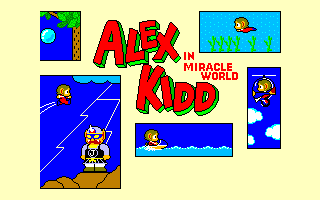
Dayne recently gave an excellent blog on the world of emulation, focusing on arcade emulation, but only briefly touching on the life changing world of console emulation, which I will elaborate in-depth upon.
When I was around about the age of seven the must have gadget was the Sega Master System 2 (to which there is appropriately now an online museum dedicated to-
http://alexkidd.com/). My parents made what I now have come to consider their biggest mistake in my upbringing, they wouldn’t buy me one! Luckily, I had a few friends with them, and to me they were the most awesome things in the world (the consoles not the friends). Nothing compared to a spin on
Alex the Kidd in Miracle World (which came bundled free on the Master System 2), providing endless hours of excitement as we tried to defeat those evil paper, scissors, rock playing bosses and receive those magical hamburgers that transported us to the next level! They were great times, but at the end of the day I would always be dragged home to my Master System deprived home. As you have probably gathered by now, in contrast to the happiness I felt behind the console, these were very sad times. But a few years back, things were about to change for the better, as I was introduced to the world of console emulation. Basically (as Dayne mentioned in relation to arcade emulation) these are “a program for a computer, that can emulate a video game console, so a computer can be used to play games that were created for that console” (courtesy of
Wikipedia). All that is needed from there is downloading of a copy of your favourite console games, which are known as ROMS, and in no time you can be playing those great childhood classics.

For me this was reawakening of my under fulfilled craving for the Master System, and ended in hours of playing Alex the Kidd. I felt like a big gap in my life had been filled and thus a level of fulfilment and happiness was found within me, not seen since the days before I was deprived of my birthright to play Sega. If unlike me you don't feel that the Master System can take you to the level of fulfilment I experienced, do not despair as there are also emulators and ROMS available on the internet for most other consoles including the Sega Mega Drive, Super Nintendo and more recent consoles such as the Nintendo 64, Playstation and Dreamcast. A good place to start your journey into the world of console emulation is Zophar’s Domain(
http://www.zophar.net/) where emulators for almost every console that has ever been emulated can be downloaded, including emulators that can be run on Pocket PCs and phones (I downloaded an emulator for the Master System for my Pocket PC so I could have soul nourishing game play on the go). From here a search on Google for your favourite game title and ROM will bring up a list of sites to download the ROMS from.
Obviously with something this great and amazing being available totally free, there is bound to be ethical and/or moral implications. This is because a ROM is basically a direct duplication of copyright material, which is distributed over the internet for free. Those who put the ROMS up on the internet argue that because the majority of the games are no longer available for sale in stores, developers are no longer making revenue off the games and therefore not loosing any if the game is distributed in ROM form. While this maybe true in some cases, it is common practice now for developers to release classic packs for modern consoles, such as the
Sega Classics Collection recently released for the PS2 which includes a range of old console titles. In

this case the titles are still in use and brings into question as to whether the claim that developers do not loose out on revenue is true. Obviously this is an issue that is not only found in relation to console emulation, but in a much larger way in relation to the file sharing of Mp3’s and films.
Therefore there are ethical and moral issues in relation to console emulation, which is something that we all have to personally analyse and come to a decision on yadayadayada... personally if breaking the rules a little can bring such long term happiness and fulfilment for you as it did for me, this obviously vastly outweighs any ethical or moral issues, and choosing to get involved in the fantastic world of console emulation is a 'no brainer', do it now!
Alisdair Hungerford-Morgan













